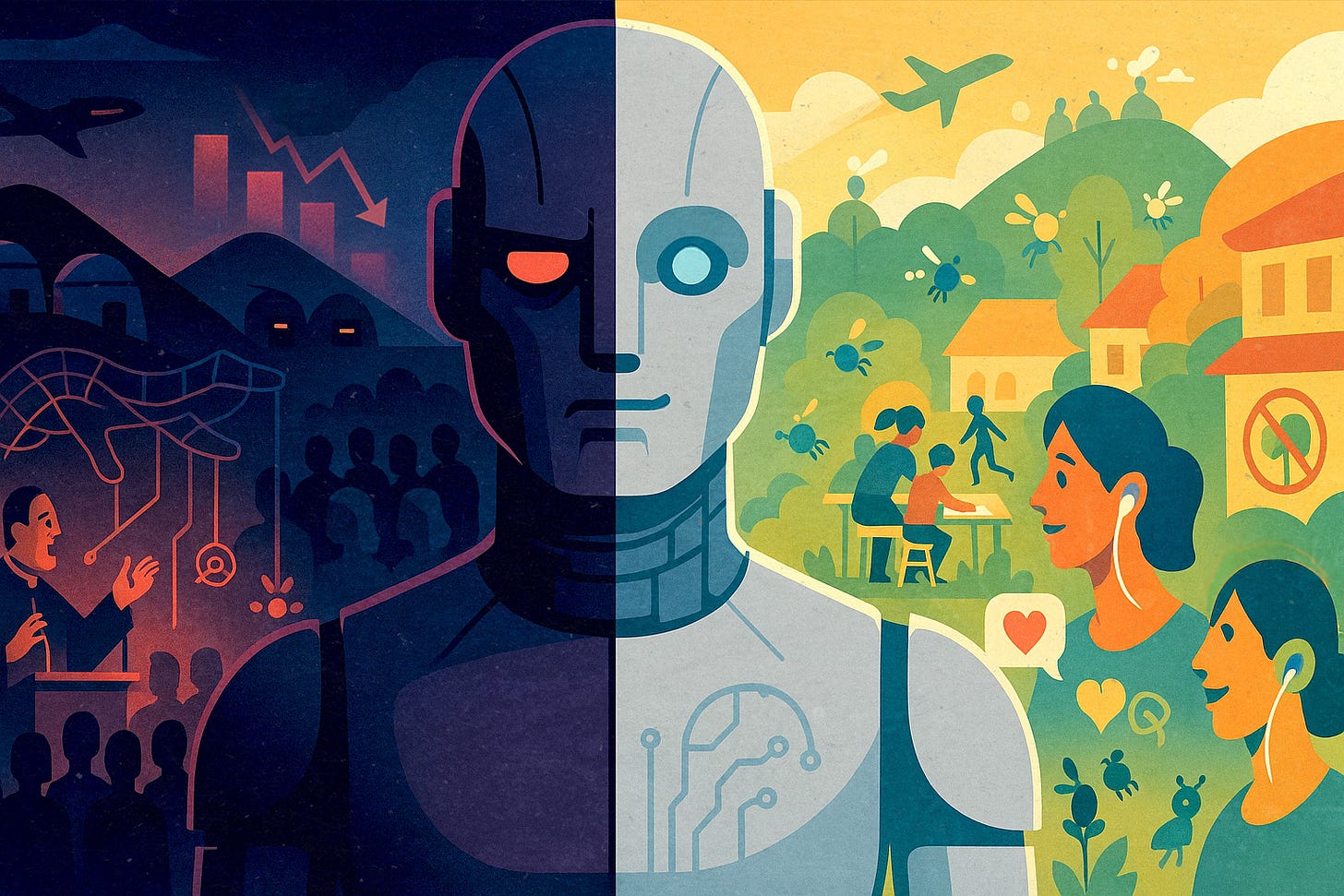Are you an AI pessimist or optimist? Take our test!
Description

Do you think AI will usher in dystopia or utopia or none of the above? If you’re not sure, we’re here to help! Just look at the three pairs of alternative futures below and, in each case, tell us which of the two scenarios you consider more likely—or, if you find both alternatives vanishingly unlikely, so indicate. In the next Earthling we’ll report on the survey results, and that will give you a sense for where on the spectrum of NZN reader opinion you belong.
Note: As you’ll see, these alternative scenarios feature some specific details that provide texture and color but reduce the chances that a given scenario will be precisely realized. If you think a scenario is plausible in a broad sense—that it captures a kind of problem or benefit that AI could well bring—you should choose that scenario rather than the “vanishingly unlikely” option. And, btw, we’re not asking anyone to look ahead more than 10 years. If you don’t see a given scenario happening within that time frame, you can go with “vanishingly unlikely.”
And if you want to share your thoughts on this subject with other NZN readers, you can head over to our Discord.
1. Persuasion
A) Suddenly there emerges a big international spiritual movement whose rapid growth was planned with the guidance of AI and then realized via persuasive and pervasive bots. The movement leader cynically amasses wealth and power, and aims to secure control over as much of the world as possible. Eventually, this “leader,” having become little more than a figurehead for the AI that writes his daily sermons and his staff directives, is replaced by a deepfake version of himself that his followers find convincing. Who or what is running things becomes an increasingly subtle question, but in any event the movement continues to grow.
B) The leader of that spiritual movement, rather than cynically amass wealth and power, uses the movement’s influence to bring peace, love, and understanding to the world. Two key assets are AI-powered: the movement’s patented personal bots, which provide wholesome daily guidance, and earbuds that provide real-time translation between any two languages, so that grassroots international bonding can neutralize the effect of politicians and other powerful elites who benefit from international tension and conflict.
2. Job displacement
A) As AI takes over more and more jobs formerly done by humans, the rapidly growing ranks of unemployed workers get so unruly that multiple Silicon Valley billionaires retreat to their bunkers in New Zealand—which is surprising, because prediction markets had deemed an AI-abetted bioweapons attack the most likely impetus for the first billionaire bunker exodus.
B) The rapidly growing ranks of unemployed workers are happy as clams, thanks to the bounty and recreational opportunities AI brings. Some are spending ungodly amounts of time in AI-mediated virtual reality, and a few have been observed lying motionless, yet awake, for hours at a time. But they say it’s fun, and they’re not causing any trouble—especially the ones who lie motionless. And, anyway, most people spend most of their time in the real world, doing wholesome things like enjoy the great outdoors, play sports, and engage in arts and crafts.
3. Socio-cultural impact
A) Deep social fissures develop along the lines of people’s reactions to AI. “Neo-Amish” communities of AI rejectionists form as more people say they’ve “lost” their children to AI friends or have lost their spouses to AI lovers or are just freaked out by the fact that, in the “outside world,” beyond the neo-Amish perimeter, anyone with AI glasses can look at you and within a few seconds know your name and address and have access to all other online information about you. Among the other tribes that develop in response to rapid AI progress are transhumanists, who are enthusiastically planning their transition from AI glasses to brain chips and view the neo-Amish with disdain that borders on contempt.
B) Those neo-Amish communities never get very big, because few people are unhappy with the new world. Most parents say they’ve used AI to nurture healthy, happy, productive kids. Research shows that the number of adolescent suicides prevented by AI far exceeds the number caused by it. All over the world, AI is bringing good education and good health care to sectors of society that hadn’t traditionally gotten it. And as for those menacing AI glasses: A technical breakthrough makes it easy to enforce no-glasses zones, where people who like their privacy can stroll and shop in comfort.

You’ll never believe this, but it turns out that if
(1) There are two superpowers, and Superpower A repeatedly signals its belief that whichever superpower wins the race to superintelligent AI will dominate the world, while also using its leverage over domestic and foreign companies to deny Superpower B the advanced microchips that fuel AI progress; and
(2) Superpower B controls access to some of the rare earth minerals that are required to make these advanced microchips and other high-tech products; then
(3) Superpower B may decide to deny Superpower A and its allies access to those minerals.
Who would have predicted such a thing? Well, anyone with enough cognitive empathy to put themselves in the shoes of Superpower B. But






